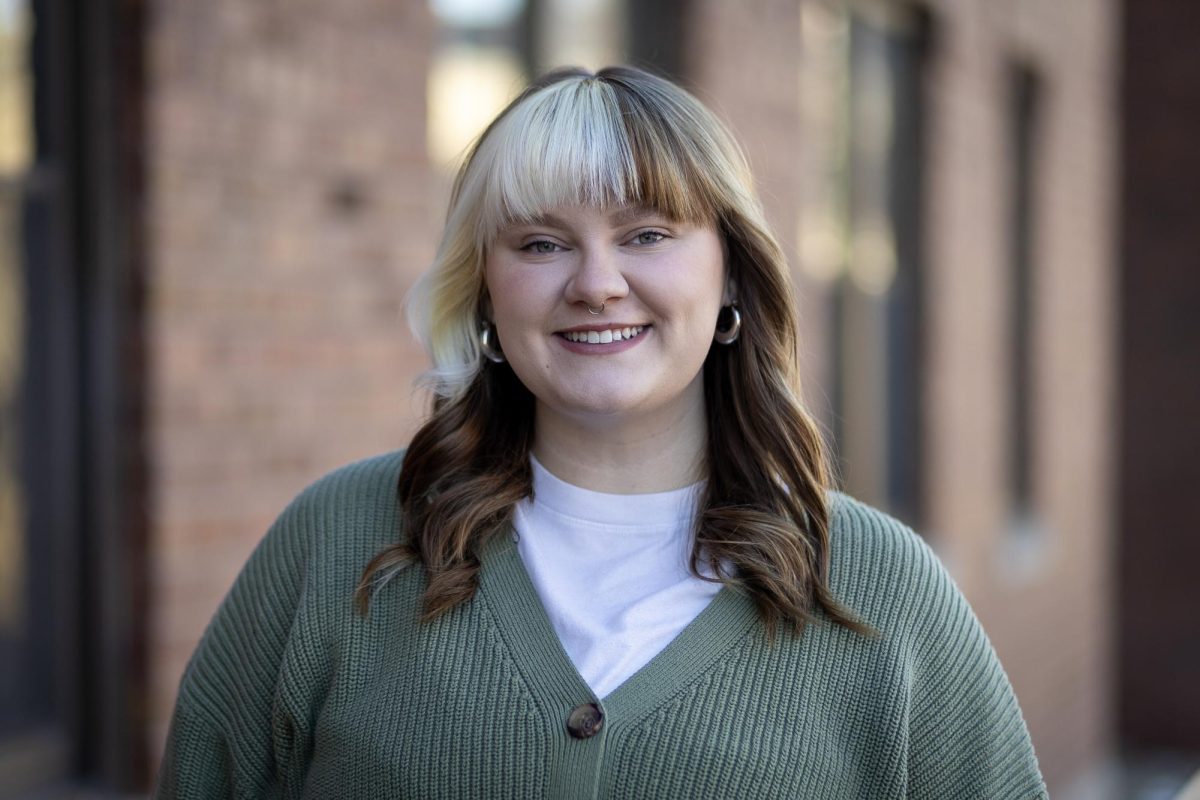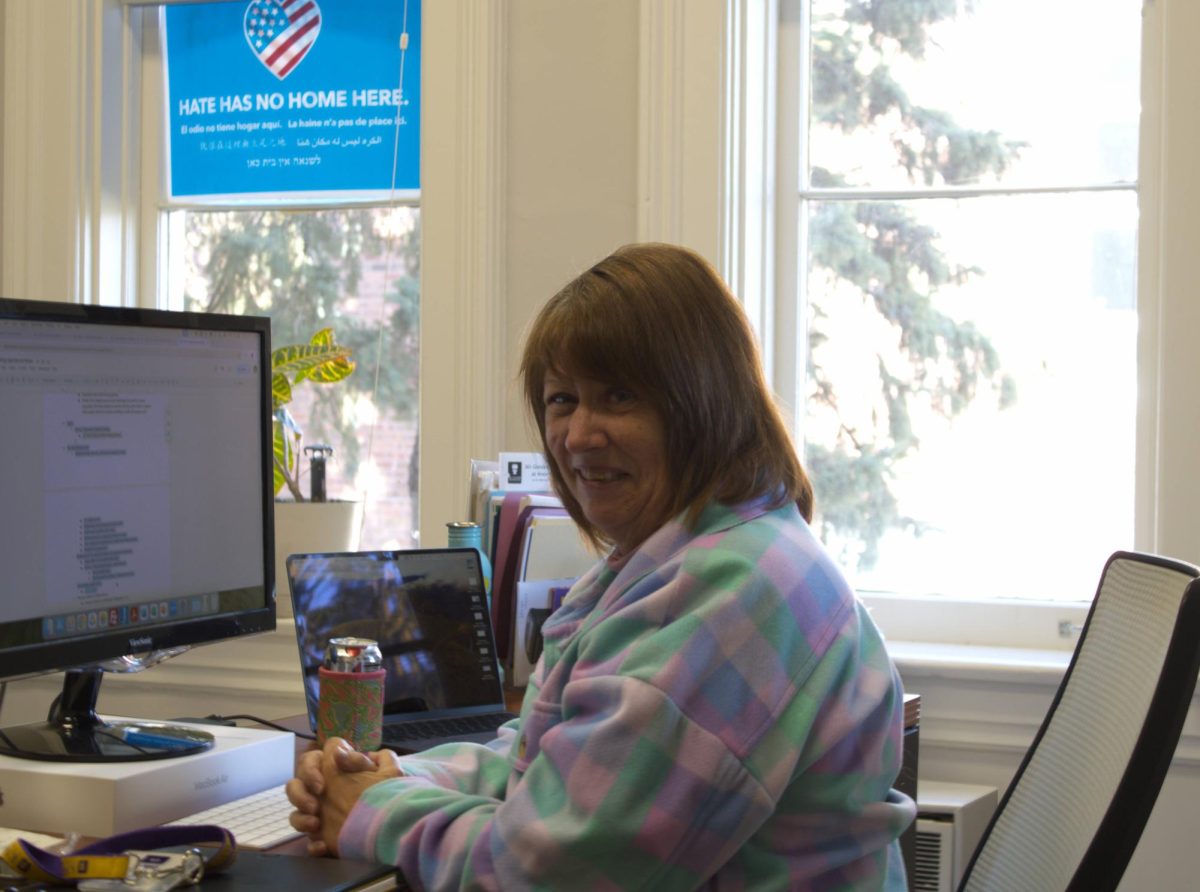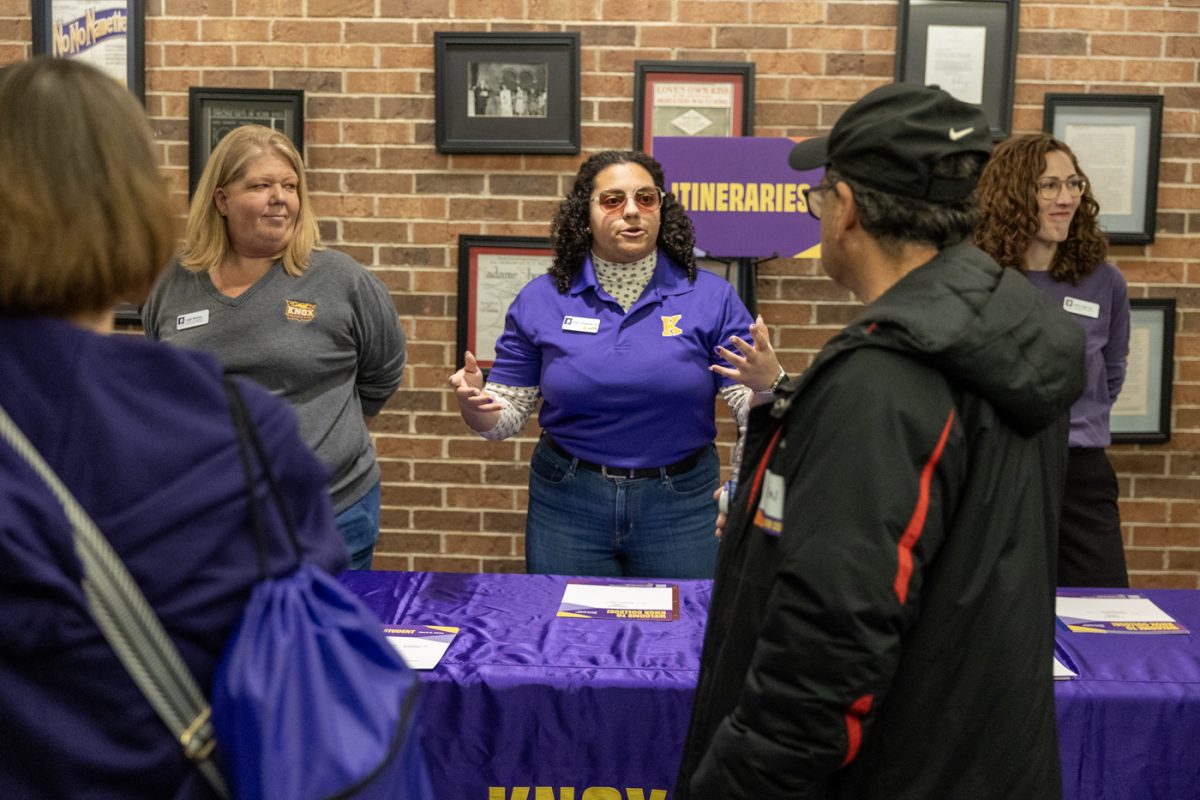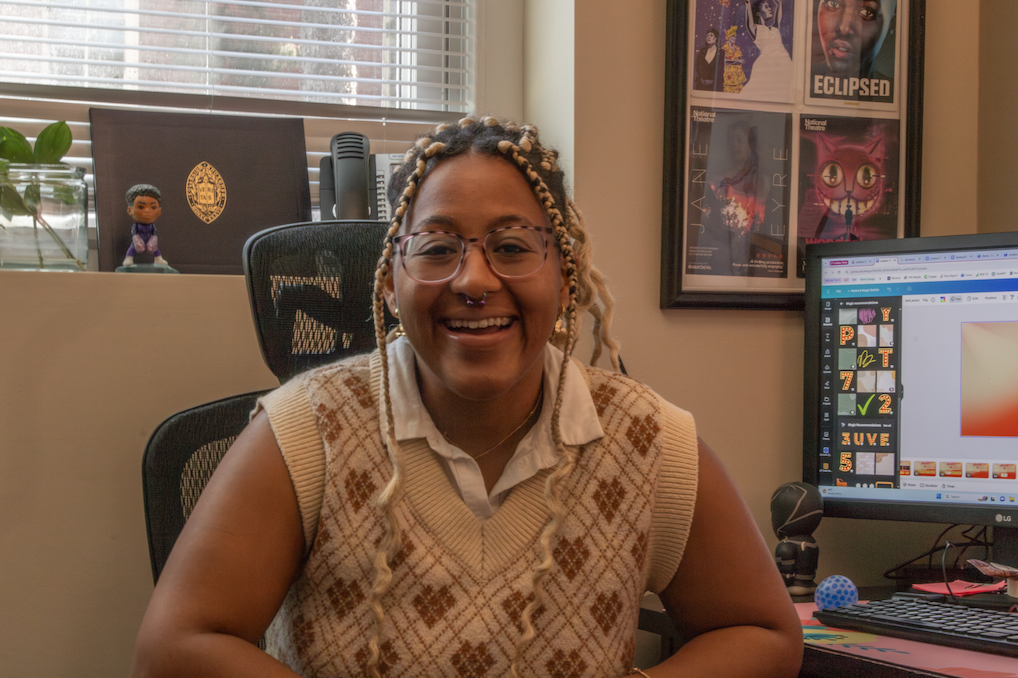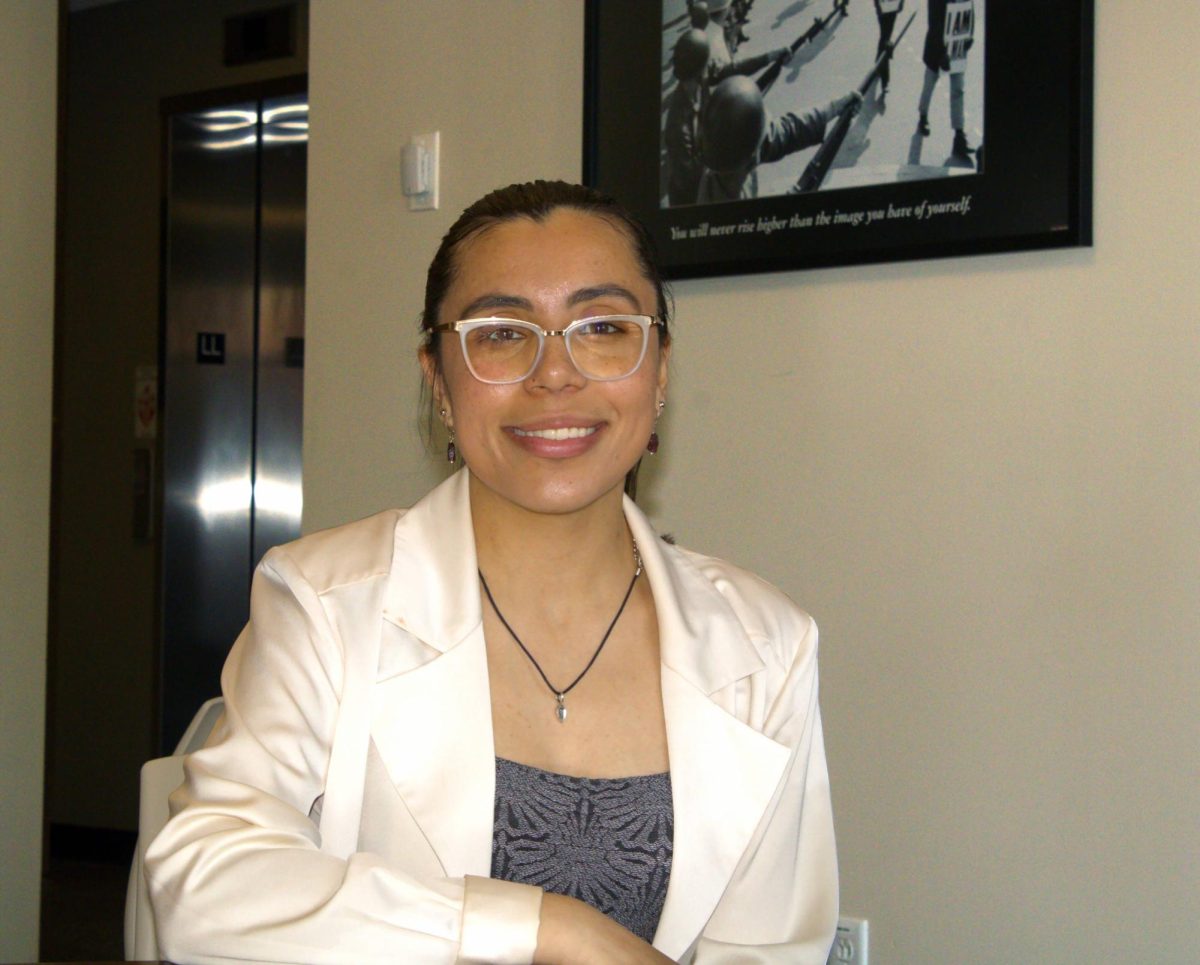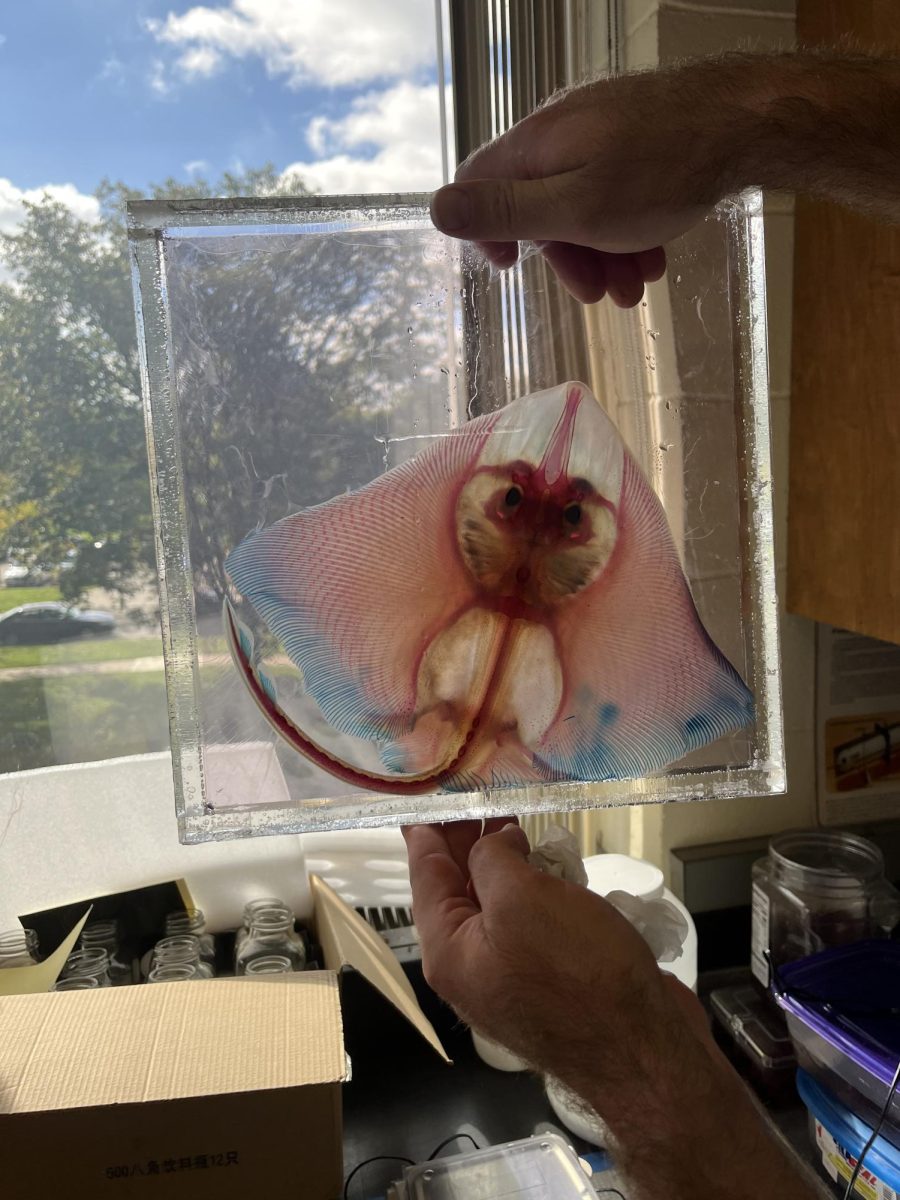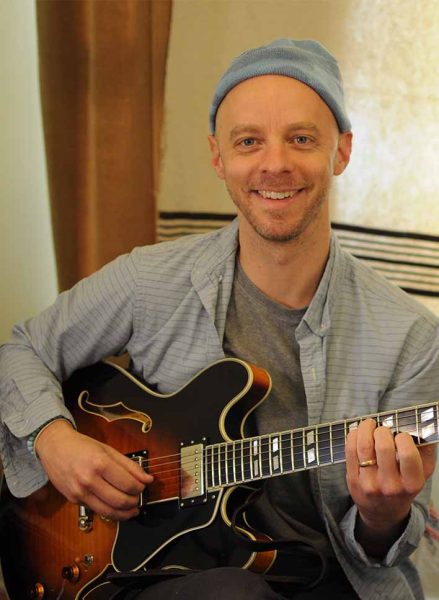
Senior Casey Foubert is an undergraduate who has already lived a lifetime as a musician. He started at Knox two years ago, picking up where he left off at his previous school. Since then, his life has been deeply changed by the things he studied and the experiences he had here.
Foubert grew up 15 minutes outside of Seattle, Wash., in the suburbs. He had a single mom who worked full time and went back to college during his childhood.
“I had a good childhood,” Foubert said. “It’s so beautiful there. Like I didn’t realize how beautiful it was until I was on tour for the first time and saw the rest of the country and then I was like, ‘oh, I live in a beautiful place,’ but I had no idea. I was like, ‘oh, there’s mountains and trees everywhere,’ and like, beautiful water. I really liked growing up there.”
The first college that Foubert attended was Cornish College of the Arts in Seattle, staying in the beautiful mountains and trees he grew up with. Being at a college of the arts meant that the overwhelming focus of Foubert’s program was the music. Students would take another class like history or English once per term, but everything else was music.
“I was studying violin – jazz violin and I wanted to be a drummer and so after two years I asked if I could switch to drums, but then you have to start over. I was like, well, I don’t think I can afford that, so I just dropped out,” Foubert said. “But it was cool because… like one of my teachers was this trombone player, Julian Priester. He’s still alive and he played with Duke Ellington and Sun Ra and Max Roach and all these like crazy jazz musicians. There were really great teachers there; it was cool, I learned a lot. But I just was like, ‘I want to be a drummer’ and I didn’t have money, so I was like, ‘okay, well…. later,’.”
After leaving Cornish, Foubert’s professional music career started, “like immediately, weirdly,” he said. He doesn’t remember the exact timing, but he was recruited to tour with Pedro the Lion, an indie rock band, right after he dropped out of school.
“I was in a band as a drummer with my friend Yuuki and my other friend Casey and we were recording with this producer in Seattle who was friends with a bunch of like more successful bands. One of his friends came to visit us in the studio and essentially, I remember him kind of like asking me to go on tour during the recording session or something like that,” Foubert said.
Despite how amazing this first tour was for him, it was also difficult as he had just experienced his first heartbreak. The emotional nature of the music he was playing was cathartic for him during this time.
“My high school sweetheart broke my heart, and then, like the next week, I was going on my first tour. Which was awesome. It was an awesome tour. It was in a band that I really liked, Pedro the Lion, and they were opening for a band called Low, which is another band that I really like…They’re so good. And so I just stood at the side of the stage and like cried every night cause I was like, heartbroken and their music’s really sad,” Foubert said.
“It was so perfect. And then from there, I always was just making records and going on tour. There were a couple points in my life where I had to stay off the road and I would get side jobs, but generally, like professionally, that first gig and Pedro the Lion was like how I met everybody else that I worked with and still work with.”
Since that first tour, Foubert has worked with many artists, including Sufjan Stevens, The Shins, Gabriel Kahane, and Richard Swift. His work ranges from co-writing and engineering, to banjo and vibraphone. During his time touring thus far, he has identified a “weird obsession with status,” from certain people he has worked with and around. However, in his work with Sufjan Stevens, Sufjan’s dedication to doing cool stuff and putting on good shows made him feel like he was in college all over again.
“The thing I’m most proud of is my work with Sufjan. The culture of his band is kind of the culture of, like, indie rock in New York in that everything was always ironic and it can be a little, like competitive and mean,” Foubert said. “Now that I’m outside of it, those are things that I realized I never liked about it. I don’t like being ironic all the time. I like being earnest.”
During one tour with Sufjan, there were 13 people in the band, which was, “wild,” for Foubert. During the tours that Foubert typically did, this one included, they would typically play the U.S. twice, then Europe, Australia and New Zealand, and Japan “if you’re lucky,”.
“Instead of sound checking we would just have two hour rehearsals every day. Which I actually loved, because if I’m going to be away from home and away from my family, I want to be doing something that’s engaging. Because tour is fun, traveling is fun, but also you’re working, and I’ve been on tours where we’re just playing the same thing every night for a year and a half and it gets real boring,” Foubert said.
“[Sufjan] would just change songs and he would do this thing where if he noticed that you were comfortable or like knew your part really well, he would change your part in some way. So after about six months of that, every night, everyone in the band was always paying attention to what they were doing because their parts were always relatively new and by the time we got halfway through that tour as the best band I’ve ever been a part of, it was amazing.”
Sufjan’s work is especially popular in Illinois because of his 2023 album, aptly titled Illinoise. Foubert was particularly connected to the Carrie and Lowell album. Songs in this album were inspired by Sufjan’s mother Carrie after her death from cancer. Sufjan’s music is known to be emotional, and as Foubert said, “It’s so sad,”. Foubert plays guitar on about half of the album.
“Working on Carrie and Lowell with Sufjan was also really special because I love those songs. He has a song about his mom dying of cancer, and I had lost my mom from cancer like maybe six years earlier, and so I was really affected by the demos that he sent me and it was hard sometimes to make it through the recording sessions,” Foubert said.
“He’s a great songwriter and he’s a great lyricist and some of the lines, would, just I couldn’t. I had to turn around on stage because I just feel them so deeply, you know. But then after like a month I was like, okay it’s fine, I’ve heard this a million times, I can make it through it… Definitely most proud of the Sufjan work, like for sure.”
While on a tour in the early 2000s, Foubert was stopped in Chicago for a show. His friend Caroline messaged him and asked if she and her sister Jennifer could come to his show. They came and Foubert’s band needed a place to stay, so Jennifer offered her apartment.
“Jennifer was living with a bunch of college friends in Evanston and so we went back to their apartment, and just hung out and talked all night and went for a long walk. And like there was definitely like butterflies. But nothing happened, but she left her wallet in the car, and so I had to go back and give her her wallet. And I got her phone number,” Foubert said. “I think we talked every day after that.”
Jennifer McCarthy Foubert has been an Assistant Professor of Education at Knox since 2017. Their connection was immediate, but Foubert still had tours to finish and new bands to play with. The tour lifestyle meant that Foubert was constantly moving back and forth between home and touring which made marriage more complicated.
“When you’re figuring out what your marriage is, it’s hard to do that on tour because sometimes she would need more from me than I was able to give on tour. And sometimes I would need more from her than she was able to give while I was not around. And then the other thing that’s really disruptive about tour is you get used to your life on the tour bus and Jennifer would get used to her life like alone in the house and then I would come home and everything would be different for two weeks and then I would leave again,” Foubert said.
They have a 10 year old daughter, and had been married for 10 years before having her and Foubert ended up spending a lot of that time on tour.
“When my daughter was born, I tried to stay home for a year. I got a part time job in Madison where we were living. And then Sufjan did a big tour and then went out on that whole tour and then I got another big tour right after it. And so I was gone for like three years like basically home for two weeks and on tour for two weeks for like almost three years,” Foubert said. “It sucked. It was a bummer. And by the time I was done with the one after Sufjan I was like, I don’t know if I want to do this anymore.”
One factor that influenced Foubert’s return to school was the tuition benefit from his wife being employed by the school. However, that was definitely not the only reason. Foubert’s initial plan was to shift the focus of his career from being a side musician to being a singer songwriter.
“I’m the kind of person who’s always trying to learn something new, and it’s kind of hard to do on your own. I mean, you can get so far, but I’ve noticed that if you’re around people who know something, it’s easier,” Foubert said.
“A lot of people I’ve worked with have substantial passive income from streaming and record sales. So I was like, ‘I need to have that. I need to be the songwriter. I need to be the composer’. But then I realized how long it would take to build a career that would be financially stable, like it would probably take like 10 years unless I got lucky. And even then, it’s kind of like a lottery. Like you just never know if the music that you’re making is going to find an audience.”
While at Knox, his focus shifted when he, “sort of finally had a midlife crisis,”. As a student, he began working in the archives and took a museum studies class. He was hooked.
“I was like, ‘ what am I even doing?’. Then Joseph Taylor in the archives, and I were friends already and he kind of jokingly offered me a job in the archives, or like mentioned I should apply for one. And then I was like, ‘oh, what would that be like?’ And it turns out it would be awesome,” Foubert said.
“So then I got really interested in libraries in general and then I started to think about, ‘well, what if my life can be bigger than music?’. And ever since I sort of stepped out of the stream a little bit, I’m starting to notice things about, especially like, Indie rock that I don’t necessarily enjoy. And I was like, ‘what if I could just make things that were really personally meaningful to me?’ like going on tour with Sufjan or playing with him. Although he’s like not touring or like it’s not really a gig anymore. So then I was like, ‘well, what if I could work in a library and also still make music,’ and it turns out it’s like, really possible.”
Foubert has always been curious about historical primary sources. He was very excited when he learned that working in archives would let him engage with them directly, but didn’t exactly expect something like this to become a focus of his education and future career.
“But that’s what I found here and it was magical and I was like ‘I could actually do this and I would be really happy,’. So then I would only do things like the honors project and make my own records and then when people asked to hire me to do stuff, I can be really picky and just be like, ‘what do I really think about this?’,” Foubert said.
There is a small client base of people he enjoys working with that Foubert will continue to work with if they ask in the future. For new work, however, he will allow himself to be more picky and prioritize his music, personal life, and goals.
“For new work, I would say, ‘do I really want to work on this or not?’, and ‘do I have time for it?’ and really start prioritizing my own music but like not having to put any pressure of making money which will make it more honest really,” Foubert said. “Like the honors project music; I wouldn’t necessarily do that as a way of making money. That was more something that I really thought was cool.”
As a nontraditional student, now 45, who already has a performance career, Foubert has found himself working with students who are at a very different point in their lives and musical careers. This has provided him with new energy and has been important to his development.
“I came directly off of an international professional tour into playing in the Cherry St. Combo, and it took me like a minute to get my bearings because it was such a different musical experience. But one thing I noticed was that everyone just like, loved doing it and everyone had other interests besides music. It wasn’t their whole world. It just felt really, like earnest and beautiful,” Foubert said.
The experience allowed him to step back and reflect on the culture of his previous work. The pressure to be “cool” is immense and his time at Knox working with younger musicians has broken him out of that mindset.
“There’s another aspect of the kind of musical culture that I work in that’s like, being cool is important. Like how you look, and how you dress, and how you act. And people are really insecure because it’s not a meritocracy, you know, like, which doesn’t matter. I think if you’re doing something cool, like cool in the sense of something interesting,” Foubert said.
“So to come here and be around all these musicians who were just like learning and just really open and enthusiastic, it was really revelatory. And it took me about a year, but it changed my approach in a really profound way that I’m so grateful for. Where before, it was hard to not participate in the kind of like, ‘how cool does my guitar sound?’ and, ‘am I playing the coolest looking guitar?’ and like, ‘what do I look like on stage?’. All of those kinds of things that I found to be so, just vapid and dumb, you know, and interestingly enough, that’s one of the things all the visiting musicians I brought to town. It’s one of the first things they noticed. was just how earnest everyone was here. So it was amazing.”
Foubert’s honors project was a space where he allowed himself to not be so wrapped up in the culture he has experienced. During his honors project, he decided to just do something that makes him happy. He didn’t want to worry about if his sound is innovative enough or if he’s using the most interesting and new equipment. Foubert sought to make something that he was proud of, and he succeeded.
When it came time to play his own music during the honors project, Foubert’s time touring meant that he knew how to hire a band and had friends who are really good at doing the kind of music that he makes. This made the process very smooth; he sent his bandmates the record and a spreadsheet of what he wanted them to play, they showed up, rehearsed once, and they all already knew the whole record and all of their parts.
“And some of them, like Jen Wasner, she had ideas. She was like, ohh. I think you should do this here. I think you should try doing this here. I knew on some level that if I hired this group of people, that I would kind of be like that, that they would be … sensitive musicians who don’t have big egos and also like work really hard,” Foubert said.
“And that’s what all of them are, like Sean Carey, one of the drummers, he sort of famously got that gig in Bon Iver because he just learned Justin’s [Bon Iver’s founder] first record, like the whole thing, and just went to one of his shows. They lived there from the same town and he just went to one of Justin’s shows and was like, ‘I know the whole record, can I be in your band?’ basically. It might be a little bit different than that. So like anytime I play with Sean, I just send him the music and he just learns it.”
While he was proud of his project and confident in his bandmates, performing his own music felt strange to Foubert. He was used to being a side musician and being outside of the limelight.
“It’s so uncomfortable to play my own music, like it’s physically uncomfortable for me. There was one moment in the honors project show where I had James and Sean, the two drummers, play a little drum solo together. And I just hid behind the desk,” Foubert said. “I don’t like promoting myself. I don’t like talking about myself. I don’t like all that stuff, it’s really uncomfortable for me. But I like playing music and I like helping people, so touring with other people’s music is really satisfying for me, and I do like being on stage in the sense of like I like being in the center of something creatively vital. Almost all of the touring I did was like that. It was always like something where I was like, ‘wow, it’s really special,’. So that part of it was fun, but I’m more comfortable being a side musician, especially if there’s no lighting on me.”
However, for Foubert, performing in Galesburg feels different. There’s more community and less pressure.
“My favorite thing about playing here in Galesburg is I think it’s a real community event. Like the other reason why I decided not to pursue a singer-songwriter career seriously is I don’t like being the center of attention. But playing here in Galesburg. I always feel like I’m just seeing like all my friends and like community members. It always feels really nice, to look out in a room and be like I know half the people so it doesn’t feel like an ego project or like people are necessarily looking at me. It feels more like we’re gathering to like, have a celebration of music. and that’s what it felt like. And then also being in the red room is so pretty and like, yeah, it felt really good,” Foubert said.
As his time at Knox comes to a close, Foubert plans to pursue a degree in library and information studies at the University of Wisconsin – Madison, the same university where Jennifer earned her Ph.D. While he will still continue to make his own music and work as a side musician, he understands that the music-centric part of his life may be over.
“Halfway through my time here, I was like, I would be happy if I never went on tour again. It’s like, I feel really lucky that I got to do all the touring I did, but it’s because most of it was really easy. The first touring I did was really hard, like sleeping on the floor in a van, but later on we were in buses and flying everywhere and it was super easy and there was money and so we were just going out for amazing meals all the time. But the going back and forth, it’s just really hard and it’s hard on a relationship,” Foubert said.
After grad school, he plans to pursue a career as either an academic librarian or an archivist at a college “or other interesting institution,”. Despite his master’s program being fully online, Foubert, Jennifer McCarthy Foubert, and their daughter are moving from Galesburg to the Chicago suburbs this summer.
“It’s bitter-sweet: we’re very excited about our new adventures, but will really miss the community here at Knox!” Foubert said.

